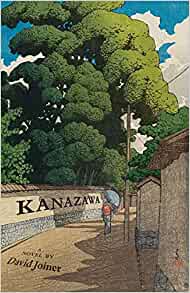Stephanie Jane recenzis Kanazawa de David Joiner
A beautiful novel
5 steloj
On spotting review copies of Kanazawa on NetGalley I immediately remembered how much I had enjoyed David Joiner's previous novel, Lotusland, some years ago now, and so was delighted to be offered the chance to read his work again. Kanazawa proceeds at a very different pace to the books I had read just preceding it so it did take me a few chapters to truly get into the book, to slow down and appreciate its vision. This was, I thought, one of David Joiner's themes though so it felt appropriate to have this experience.
I loved the depiction of Emmitt and Mirai's relationship with their stilted conversations highlighting the cultural chasm between them. Raised with very different life expectations, they do come across as being committed to each other and with similar outlooks, but struggle to communicate effectively which leads, unsurprisingly, to deep misunderstandings. I could empathise with Emmitt's desire …
On spotting review copies of Kanazawa on NetGalley I immediately remembered how much I had enjoyed David Joiner's previous novel, Lotusland, some years ago now, and so was delighted to be offered the chance to read his work again. Kanazawa proceeds at a very different pace to the books I had read just preceding it so it did take me a few chapters to truly get into the book, to slow down and appreciate its vision. This was, I thought, one of David Joiner's themes though so it felt appropriate to have this experience.
I loved the depiction of Emmitt and Mirai's relationship with their stilted conversations highlighting the cultural chasm between them. Raised with very different life expectations, they do come across as being committed to each other and with similar outlooks, but struggle to communicate effectively which leads, unsurprisingly, to deep misunderstandings. I could empathise with Emmitt's desire to retreat into an older ideal of Japan by way of renovating the machiya house, but I could also understand Mirai's envy of her sister's opportunities leading her to want to emulate them.
Joiner's love of Japan and the city of Kanazawa in particular suffuses every page of this novel and losing myself in descriptive passages almost felt like visiting for myself. I was certainly drawn to glance at flight prices after finishing reading! There is a strong sense of the importance of history and tradition in maintaining community ties, but we also see the benefits of progress. I felt that Emmitt particularly was searching for a way to balance the two. For me, Kanazawa was a quietly inspirational novel about living one's best life and not allowing other people's ideas of conventionality to stifle creative dreams. All four of the main characters have creative ambitions, some artistic and some literary. Their challenge is in finding a way to centre the emotional satisfaction of exploring those ambitions without becoming isolated by doing so.
Kanazawa is a gently paced, introspective novel that won't appeal to every reader, but is a rewarding read to those of us who enjoy such character-driven fiction. It does have a strong Japanese style and is resolutely literary in its frequent circling around to illustrious Kanazawa writers such as Kyoka (who I have not yet read, but now hope to do so soon). All in all, a beautiful novel which I am coming to appreciate more and more the longer I mull it over.

